Abstract
1. l-Tyrosine–, l-alanine–, l-tryptophan– and l-threonine–tRNA ligases (where tRNA is transfer RNA) were purified from mammalian tissues and the relative contents of cholesteryl 14-methylhexadecanoate were determined in fractions obtained during the isolation. Purified enzymes were extracted with various organic solvents. 2. Cholesteryl 14-methylhexadecanoate contents in purified ligases were up to 210-fold that in the starting material. Different enzymes showed different contents of this cholesteryl ester. 3. Extracted enzymes lost in most cases their ability to catalyse formation of the aminoacylhydroxamate and aminoacyl-tRNA complexes. Enzymes extracted with various solvents showed a variable decreased activity. 4. The original activity could be restored to 70–100% by the addition of cholesteryl 14-methylhexadecanoate. Cholesteryl palmitate, cholesteryl margarate and cholesteryl stearate were inactive in this respect. 5. Incubation mixtures of extracted enzymes with cholesteryl 14-methylhexadecanoate added showed an initial delay in the time-course of both reactions assayed. 6. It is concluded that the effect of cholesteryl 14-methylhexadecanoate on the activity of amino acid–tRNA ligases seems to be specific and that this compound may play some role in the function of these enzymes.
Full text
PDF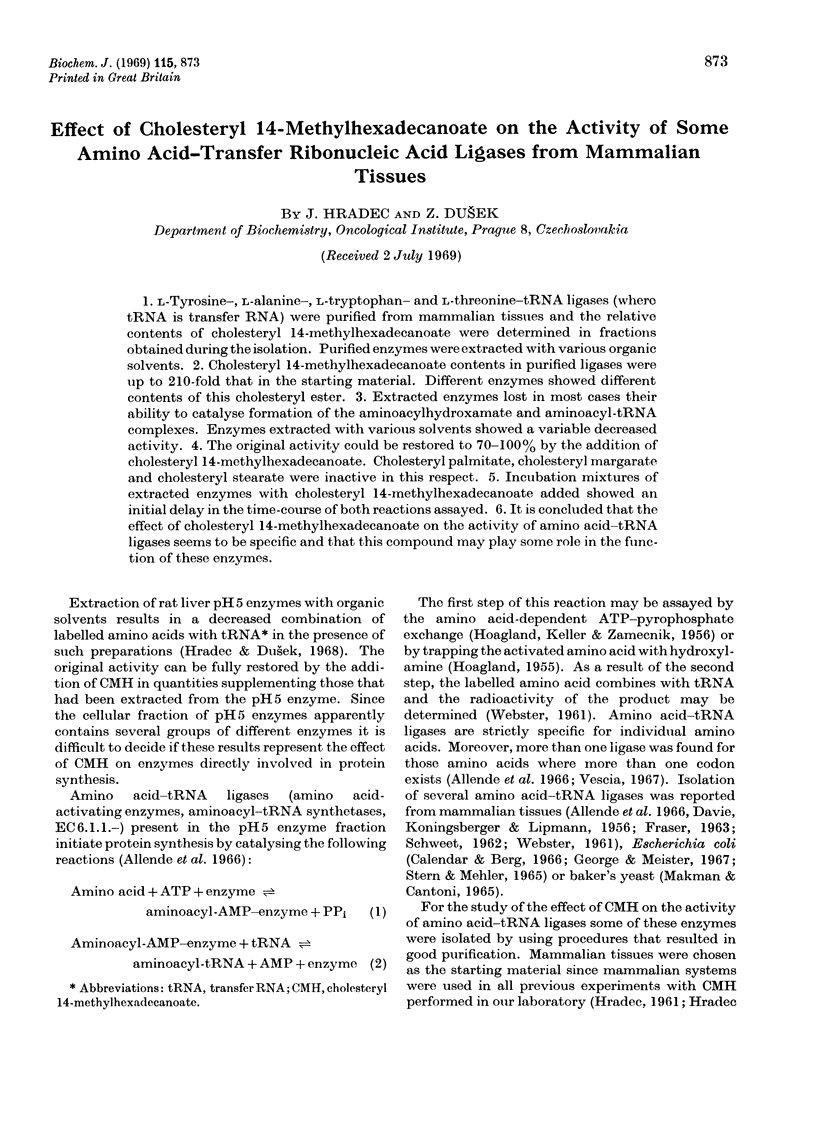
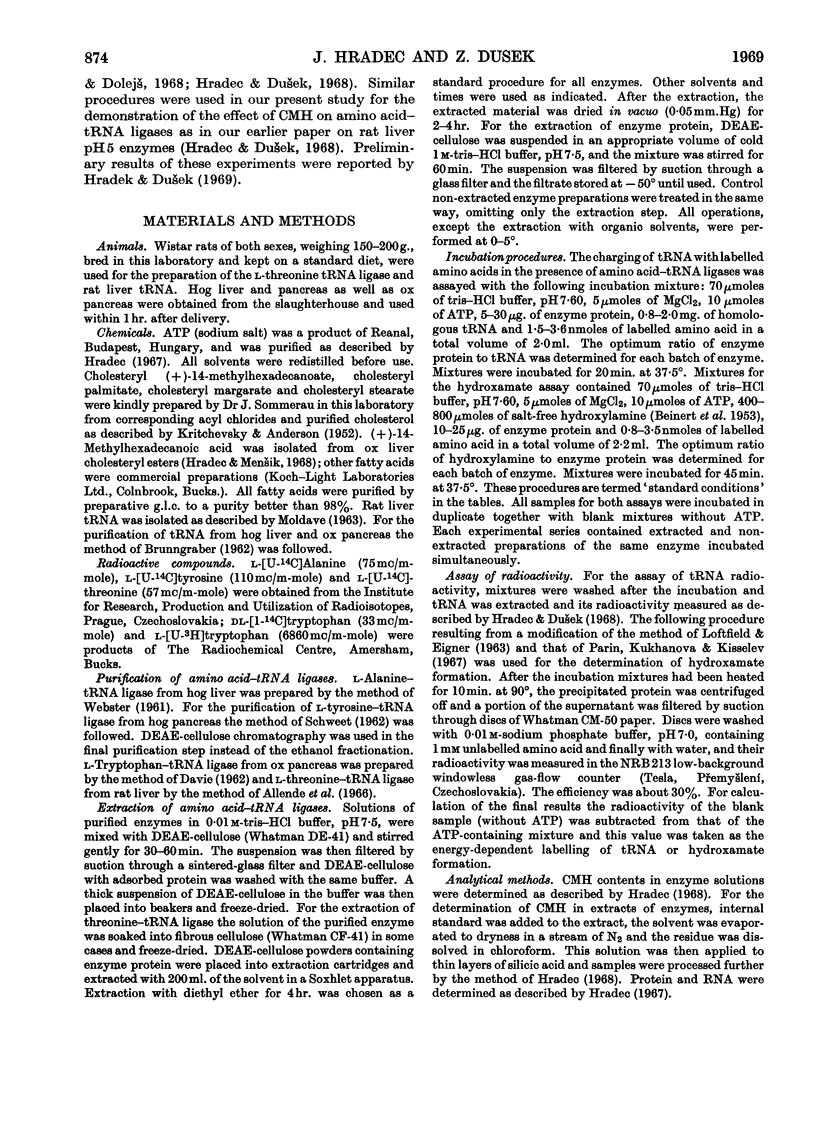
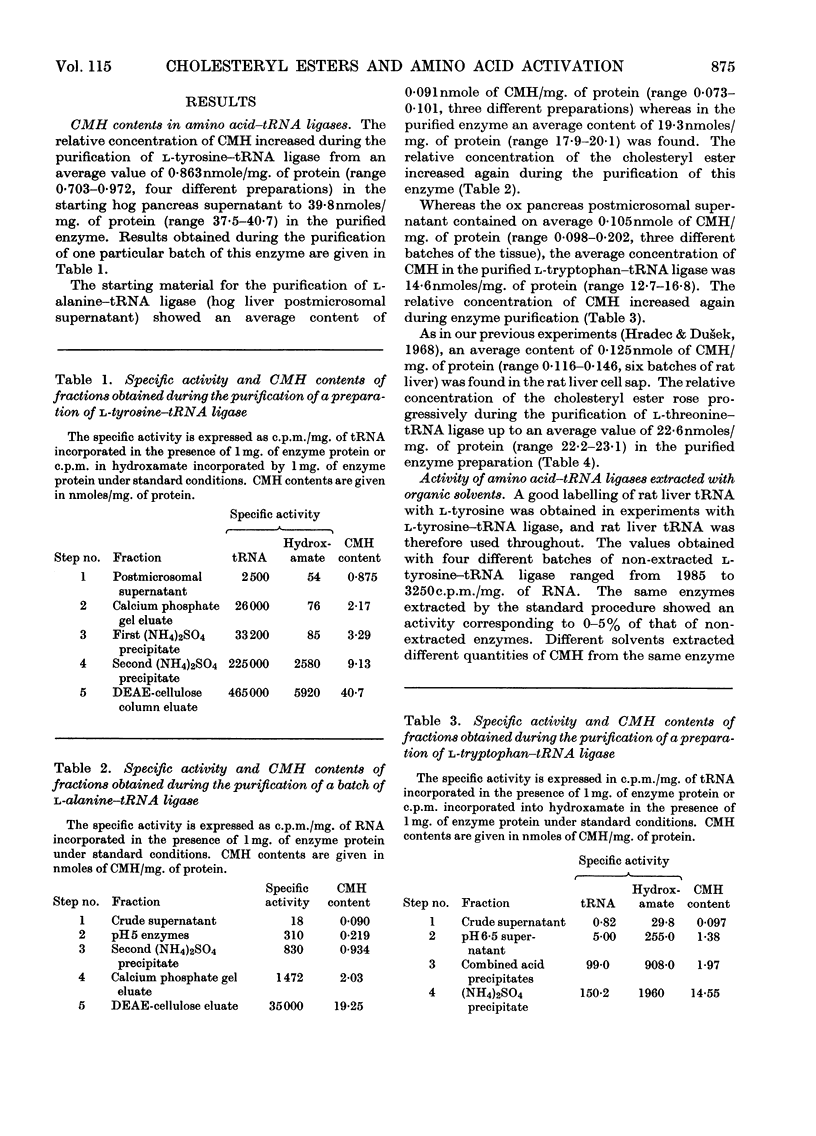
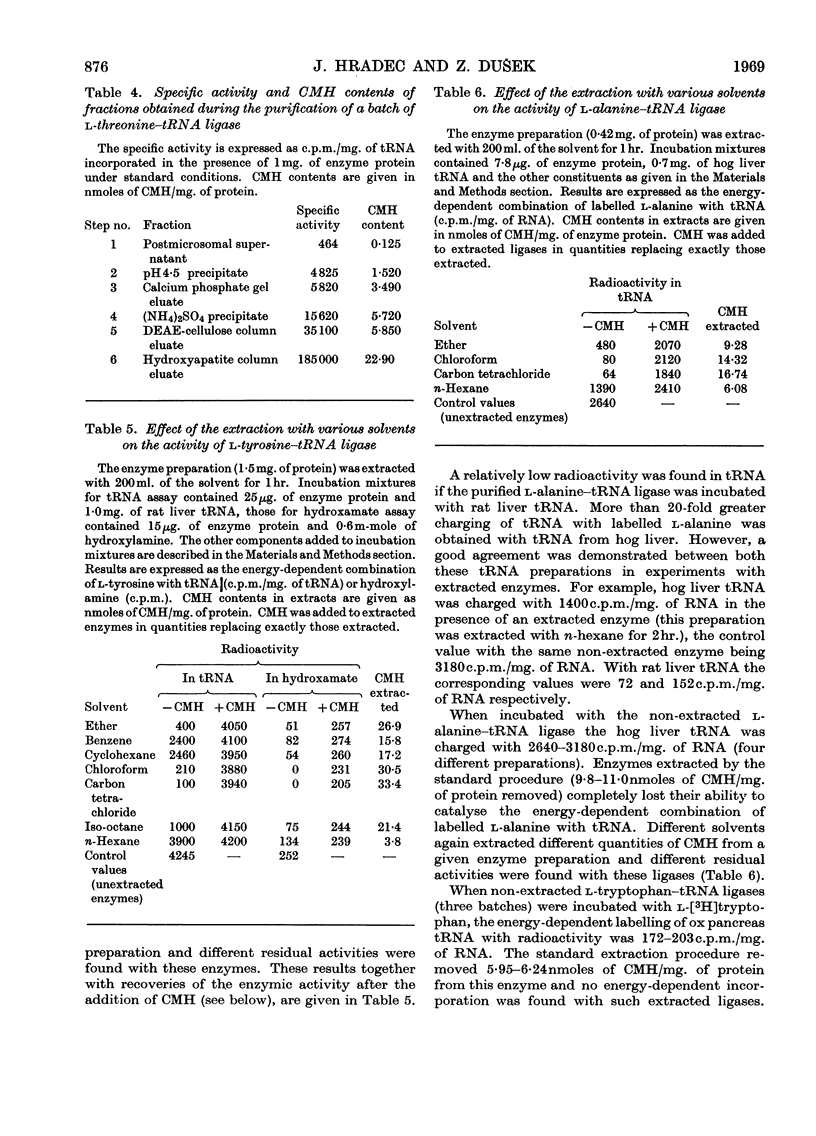
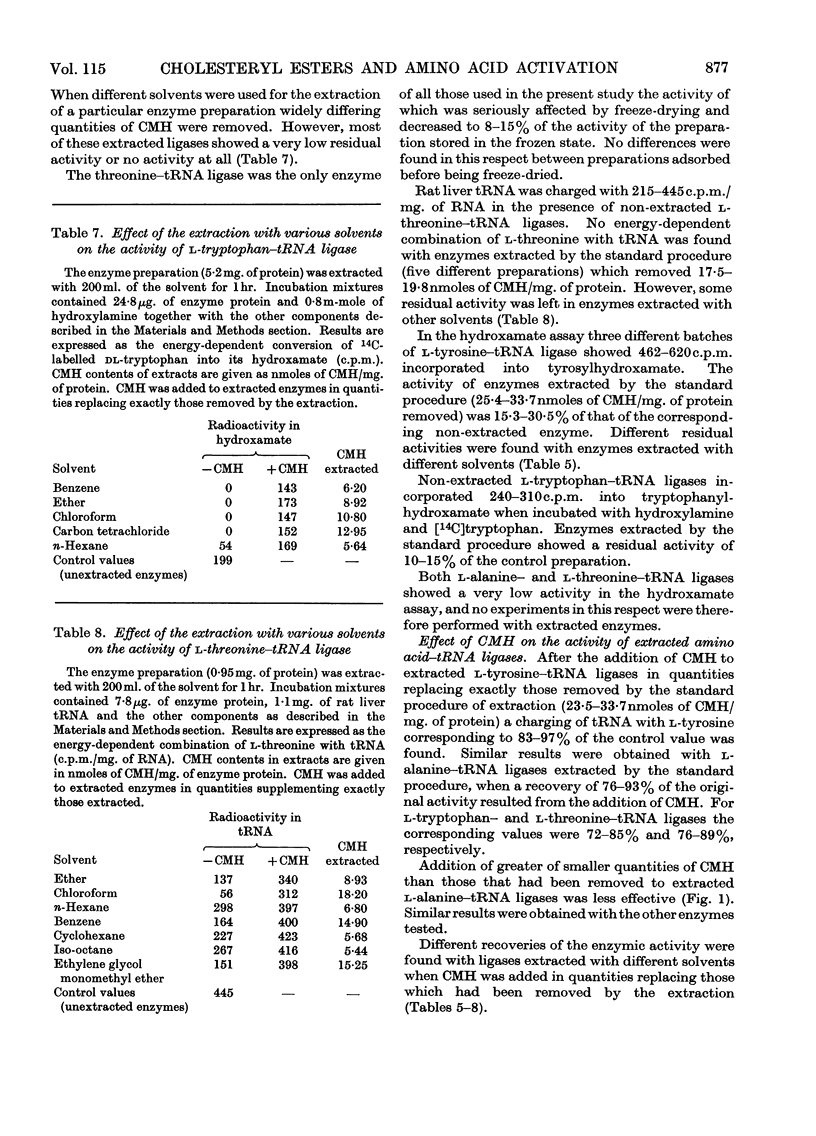
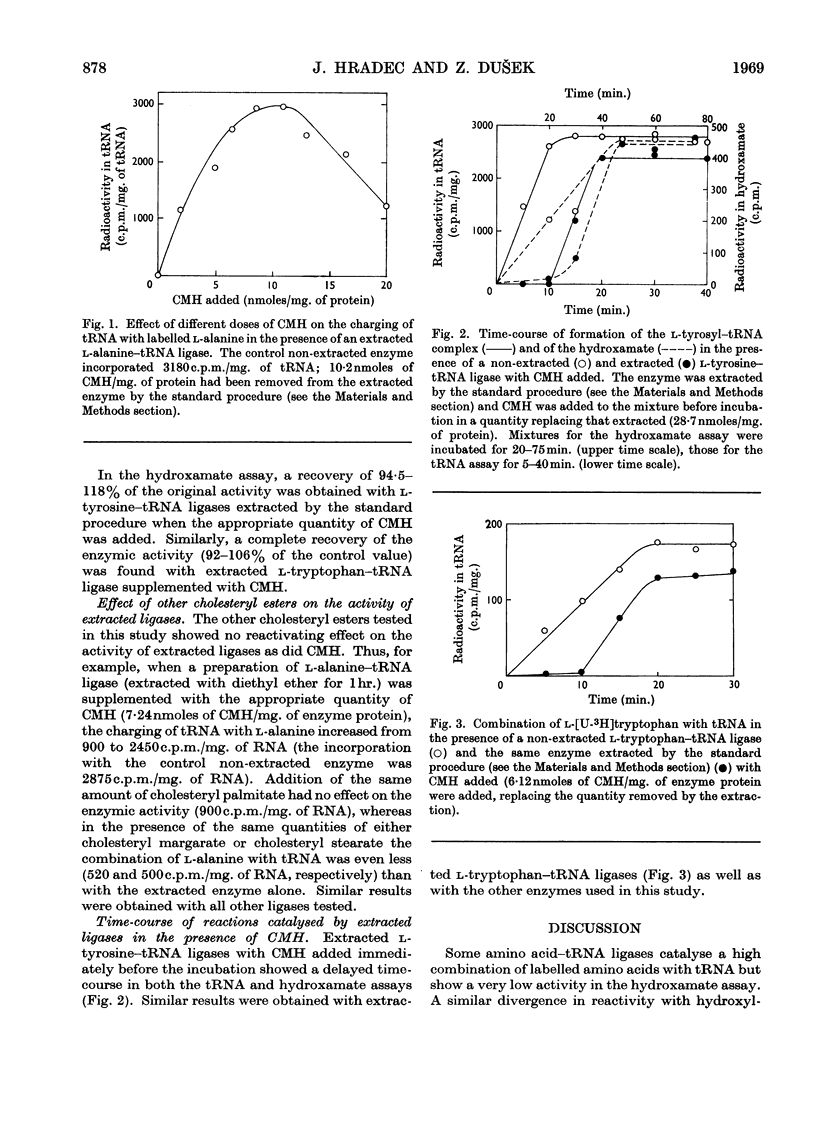
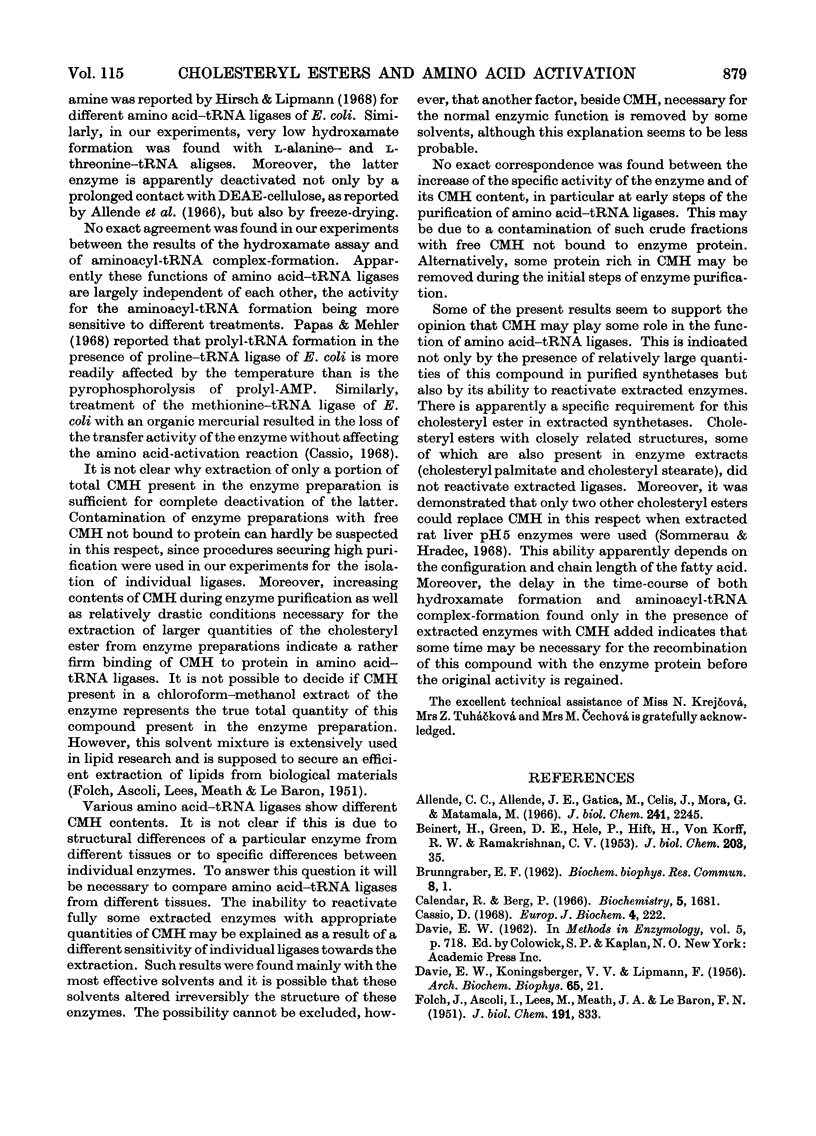
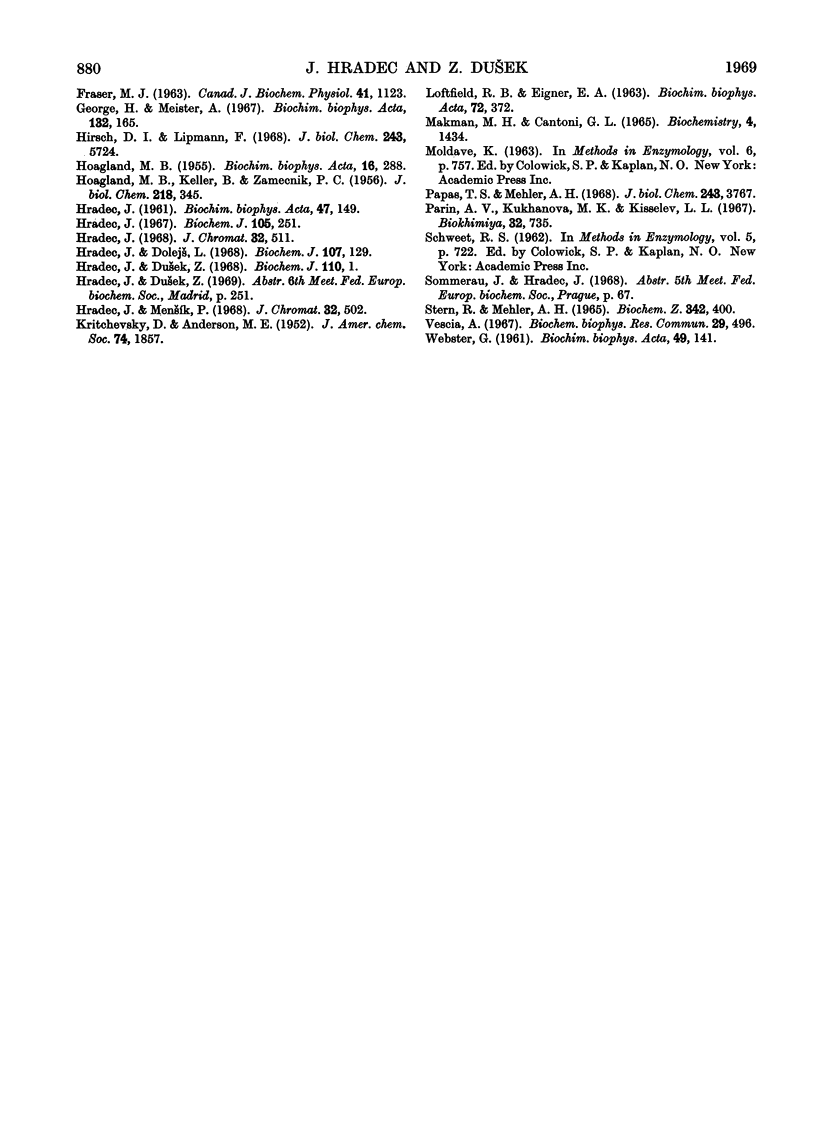
Selected References
These references are in PubMed. This may not be the complete list of references from this article.
- Allende C. C., Allende J. E., Gatica M., Celis J., Mora G., Matamala M. The aminoacyl ribonucleic acid synthetases. I. Properties of the threonyladenylate-enzyme complex. J Biol Chem. 1966 May 25;241(10):2245–2251. [PubMed] [Google Scholar]
- BEINERT H., GREEN D. E., HELE P., HIFT H., VON KORFF R. W., RAMAKRISHNAN C. V. The acetate activating enzyme system of heart muscle. J Biol Chem. 1953 Jul;203(1):35–45. [PubMed] [Google Scholar]
- Calendar R., Berg P. Purification and physical characterization of tyrosyl ribonucleic acid synthetases from Escherichia coli and Bacillus subtilis. Biochemistry. 1966 May;5(5):1681–1690. doi: 10.1021/bi00869a033. [DOI] [PubMed] [Google Scholar]
- Cassio D. Etude de la méthionyl tRNA synthétase de Escherichia coli. 2. Inactivation sélective et réversible de la capacité de charger le tRNA. Eur J Biochem. 1968 Apr 3;4(2):222–224. doi: 10.1111/j.1432-1033.1968.tb00197.x. [DOI] [PubMed] [Google Scholar]
- DAVIE E. W., KONINGSBERGER V. V., LIPMANN F. The isolation of a tryptophan-activating enzyme from pancreas. Arch Biochem Biophys. 1956 Nov;65(1):21–38. doi: 10.1016/0003-9861(56)90173-4. [DOI] [PubMed] [Google Scholar]
- FOLCH J., ASCOLI I., LEES M., MEATH J. A., LeBARON N. Preparation of lipide extracts from brain tissue. J Biol Chem. 1951 Aug;191(2):833–841. [PubMed] [Google Scholar]
- FRASER M. J. Glycyl-RNA synthetase of rat liver: partial purification and effects of some metal ions on its activity. Can J Biochem Physiol. 1963 May;41:1123–1133. [PubMed] [Google Scholar]
- HOAGLAND M. B. An enzymic mechanism for amino acid activation in animal tissues. Biochim Biophys Acta. 1955 Feb;16(2):288–289. doi: 10.1016/0006-3002(55)90218-3. [DOI] [PubMed] [Google Scholar]
- HOAGLAND M. B., KELLER E. B., ZAMECNIK P. C. Enzymatic carboxyl activation of amino acids. J Biol Chem. 1956 Jan;218(1):345–358. [PubMed] [Google Scholar]
- HRADEC J. Effect of carcinolipin on protein synthesis in cell-free systems. Biochim Biophys Acta. 1961 Feb 12;47:149–157. doi: 10.1016/0006-3002(61)90840-x. [DOI] [PubMed] [Google Scholar]
- Hirsh D. I., Lipmann F. The divergence in reactivity of aminoacyl transfer ribonucleic acid synthetases of Escherichia coli with hydroxylamine. J Biol Chem. 1968 Nov 10;243(21):5724–5730. [PubMed] [Google Scholar]
- Hradec J., Dolejs L. The chemical constitution of carcinolipin. Biochem J. 1968 Mar;107(2):129–134. doi: 10.1042/bj1070129. [DOI] [PMC free article] [PubMed] [Google Scholar]
- Hradec J. Effect of some polycyclic aromatic hydrocarbons on protein synthesis in vitro. Biochem J. 1967 Oct;105(1):251–259. doi: 10.1042/bj1050251. [DOI] [PMC free article] [PubMed] [Google Scholar]
- Papas T. S., Mehler A. H. Modification of the transfer function of proline transfer ribonucleic acid synthetase by temperature. J Biol Chem. 1968 Jul 10;243(13):3767–3769. [PubMed] [Google Scholar]
- Parin A. V., Kukhanova M. K., Kiselev L. L. Ionoobmennaia sorbtsiia radioaktivnykh atsilgidroksamatov na bumage kak metod opredeleniia aktivnosti aminoatsil-tRNK-sintetaz. Biokhimiia. 1967 Jul-Aug;32(4):735–740. [PubMed] [Google Scholar]
- Stern R., Mehler A. H. Lysyl-sRNA synthetase from Escherichia coli. Biochem Z. 1965 Aug 19;342(4):400–409. [PubMed] [Google Scholar]
- Vescia A. Separation of two leucyl-ribonucleic acid synthetases from rat liver. Biochem Biophys Res Commun. 1967 Nov 30;29(4):496–500. doi: 10.1016/0006-291x(67)90511-6. [DOI] [PubMed] [Google Scholar]
- WEBSTER G. C. Isolation of an alanine-activating enzyme from pig liver. Biochim Biophys Acta. 1961 Apr 29;49:141–152. doi: 10.1016/0006-3002(61)90877-0. [DOI] [PubMed] [Google Scholar]


